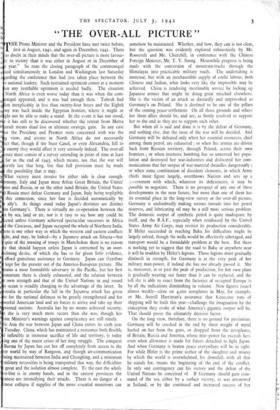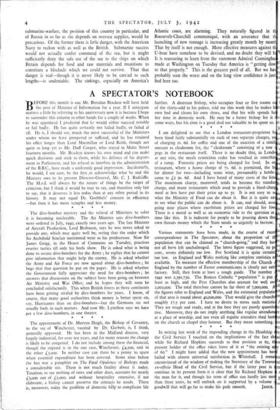"THE OVER-ALL PICTURE"
HE Prime Minister and the President have met twice before, first in August, 1941, and again in December, 1941. There no doubt in their minds that the over-all picture is more favour- e to victory than it was either in August or in December of t year." So runs the closing paragraph of the communiqué e ued simultaneously in London and Washington last Saturday arding the conference that had just taken place between the o national leaders. Such restrained optimism comes at a moment en any justifiable optimism is needed badly. The situation North Africa is even worse today than it was when the com- nique appeared, and it was bad enough then. Tobruk had len inexplicably in less than twenty-four hours and the Eighth my was back inside the Egyptian frontier, where it might or ght not be able to make a stand. In the event it has not stood, t it has still to be discovered whether the retreat from Mersa truh means dead loss or ultimate strategic gain. In any case t the President and Premier were concerned with was the g view, and events in North Africa do not necessarily t that, though if the Suez Canal, or even Alexandria, fell to enemy they would affect it very seriously indeed. The over-all tare must consist of a survey extending in point of time at least far as the end of 1943, which means, not that the war will inly last that long, but that full provision must be made the possibility that it may.
at victory must involve for either side is clear enough. ii rmany, Italy and Japan must defeat Great Britain, the United tes and Russia, or on the other hand Britain, the United States Russia must defeat Germany and Japan, Italy being negligible this connexion, since her fate is decided automatically by ally's. As things stand today Japan's destinies are distinct m Germany's. There is virtually no co-operation. between the o by sea, land or air, nor is it easy to see how any could be cted unless Germany achieved spectacular successes in Africa the Caucasus, and Japan occupied the whole of Northern India. ere is one other way in which the western and eastern conflicts ght, and may, be linked—by a Japanese attack on Siberia—but spite of the massing of troops in Manchukuo there is no reason y that should happen unless Japan is consumed by an over- elming desire, of which she has so far given little ,evidence, afford gratuitous assistance to Germany. Japan can 'therefore kept for the present out of the Americo-European picture. She I. *ns a most formidable adversary in the Pacific, but her first mentum there is clearly exhausted, and the relation between own strength and that of the United Nations in and round t ocean is steadily changing to the advantage of the latter. In stralia in particular the lull in the Japanese attack has given e for the national defences to be greatly strengthened and for werful American land and air forces to arrive and take up their inted stations. Australia has by no means achieved security, t she is very much more secure than she was, though her me Minister's warnings against complacency are still timely.
n Asia the war between Japan and China enters its sixth year Tuesday. China, which has maintained a resistance both flexible inflexible at immense sacrifice of life and territory, is today ng one of the major crises of her long struggle. The conquest Burma by Japan has cut her off completely from access to the ter world by way of Rangoon, and though air-communication g maintained between India and Chungking, and a minimum military necessities is being transported that way, the difficulties great and the isolation almost complete. To the east the whole st-line is in enemy hands, and in the eastern provinces the II 1 nese are intensifying their attacks. There is no danger of a mese collapse if supplies of the more essential munitions can somehow be maintained. Whether, and how, they can is not clear, but the question was evidently explored exhaustively by Mr. Roosevelt and Mr. Churchill, in conference with the Chinese Foreign Minister, Mr. T. V. Soong. Meanwhile progress is being made with the conversion of mountain-tracks through the Himalayas into practicable military roads. The undertaking is immense, but with an inexhaustible supply of coolie labour, both Chinese and Indian, what looks very like the impossible may be achieved. China is rendering inestimable service by locking up Japanese armies that might be doing great mischief elsewhere. She is the victim of an attack as dastardly and unprovoked as Germany's on Poland. She is destined to be one of the pillars of the coming peace-settlement. On all those grounds and others her three allies should be, and are, as firmly resolved to support her to the end as they are to support each other.
But when all is said and done it is by the defeat of Germany, and nothing else, that the issue of the war will be decided. And Germany will be defeated only when her essential resources, chief among them petrol, are exhausted ; or when her armies are driven back from Russian territory, through Poland, across their own frontiers ; or when intensive bombing -has so unnerved her popu- lation and destroyed her war-industries and dislocated her com- munications that her output of war-material dwindles dangerously ; or when some combination of dissident elements, in which Army chiefs must figure largely, overthrows Nazism and sets up a guvernment with which, whatever its deficiencies, it may be possible to negotiate. There is no prospect of any one of these developments in the near future, but more than one of them has its essential place in the long-view survey or the over-all picture. Germany is undoubtedly making serious inroads into her petrol reserves, and lubricating oil may be a still more serious problem. The domestic output of synthetic petrol is quite inadequate by itself, and the R.A.F., especially when reinforced by the United States Army Air Corps, may restrict its production considerably. If Hitler succeeded in reaching Baku his difficulties might be largely solved, though the wells would be effectively sabotaged, and transport would be a formidable problem at the best. But there is nothing yet to suggest that the road to Baku or anywhere near it will be trodden by Hitler's legions. Those legions must gradually diminish in strength, for Germany is at the very peak of her military man-power, if indeed she has not already passed it. She is, moreover, at or past the peak of production, for her own plant is gradually wearing out faster than it can be replaced, and the toll she is able to exact from the factories of occupied Europe is by all the indications diminishing in volume. New figures issued almost weekly—close on 4,000 aeroplanes in May, for example, or Mr. Averill Harriman's assurance that 8,000,000 tons of shipping will be built this year—challenge the imagination by the conception they evoke of what America's gigantic output will be. That should prove the ultimately decisive factor.
On the long view, therefore, there is no ground for pessimism. Germany will be crushed in the end by sheer weight of metal hurled on her from the guns, or dropped from the aeroplanes, of Britain, Russia and America, whose mar-power far exceeds hers even when allowance is made for forces detached to fight Japan.
And when Germany is beaten peace everywhere will be in sight.
For while Hitler is the prime author of the slaughter and misery by which the world is overwhelmed, his downfall, with all that he stands for, means the beginning of the end of the conflict.
In only one contingency can his victory and the defeat of the United Nations be conceived of. If Germany should gain com- mand of the sea, either by a surface victory, as was attempted at Tutland, or by the continued and increased success of her submarine-warfare, the position of this country in particular, and of Russia in so far as she depends on oversea supplies, would be precarious. Of the former there is little danger, with the American Navy to reckon with as well as the British. Submarine success would not actually confer command of th 2 sea, but it might sufficiently deny the safe use of the sea to the ships on which Britain depends for food and raw materials and munitions to constitute a blockade which we could not survive. That that danger is real—though it is never likely to be carr:ed to such lengths—is undeniable. The sinkings, especially on America's Atlantic coast, are alarming. They naturally figured in Roosevelt-Churchill communiqué, with an assurance that launching of new tonnage is increasing greatly month by mont That by itself is not enough. More effective measures against U-boat have somehow to be devised, and no doubt they will It is reassuring to learn from the statement Admiral Cunning made at Washington on Tuesday that America is getting d to that properly." This is the greatest peril of all. But we ha probably seen the worst and on the long view confidence is jus fled here too.



























 Previous page
Previous page